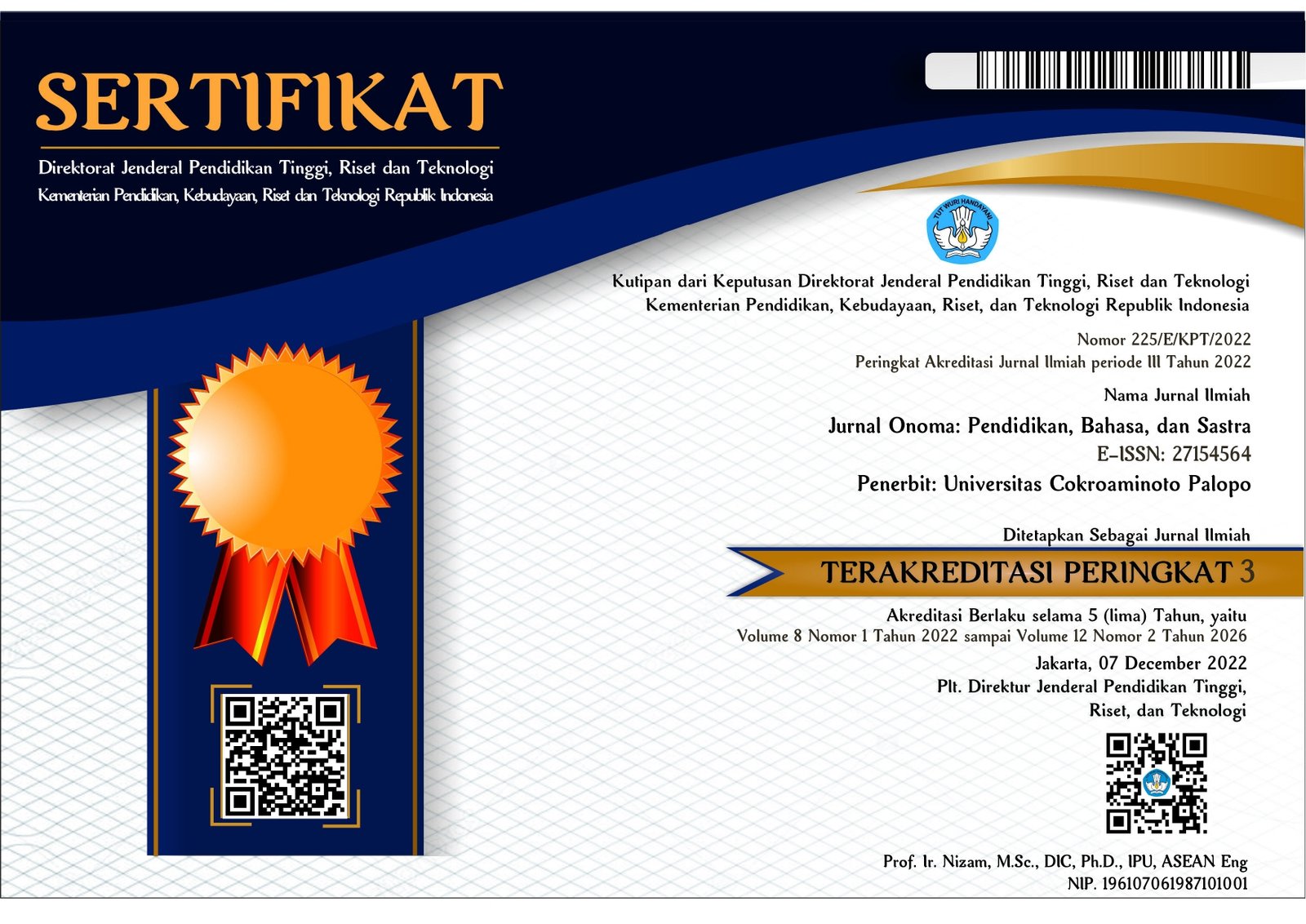Implementasi Model Pembelajaran Kooperatif Tipe CIRC dalam Meningkatkan Kemampuan Menulis Paragraf Deskriptif
https://doi.org/10.30605/onoma.v6i1.275
Keywords:
Model Pembelajaran Kooperatif Tipe CIRC, Kemampuan Menulis, Paragraf DeskriptifAbstract
Penelitian ini bertujuan mengetahui: (1) Kemampuan menulis paragraf deskriptif siswa kelas X SMA Negeri 1 Palopo sebelum dan setelah diterapkan model pembelajaran kooperatif tipe CIRC, (2) peningkatan kemampuan menulis paragraf deskriptif siswa kelas X SMA Negeri 1 Palopo setelah diterapkan model pembelajaran kooperatif tipe CIRC. Satuan eksperimen adalah siswa kelas X SMA Negeri 1 Palopo tahun pelajaran 2019/2020 dengan jumlah siswa 26 orang yang dipilih dengan menggunakan teknik Purposive sampling. Instrumen penelitian yang digunakan adalah tes kemampuan menulis paragraf deskriptif siswa. Pengumpulan data dilakukan dengan pemberian tes awal (pretest) dan tes akhir (posttest). Hasil penelitian menunjukkan bahwa (1) Kemampuan menulis paragraf deskriptif siswa kelas X SMA Negeri 1 Palopo sebelum diterapkan model pembelajaran kooperatif tipe CIRC berada pada kategori sangat rendah, (2) Kemampuan menulis paragraf deskriptif siswa kelas X SMA Negeri 1 Palopo setelah diterapkan model pembelajaran kooperatif tipe CIRC berada pada kategori sedang, (3) Terjadi peningkatan kemampuan menulis paragraf deskriptif siswa kelas X SMA Negeri 1 Palopo setelah diterapkan model pembelajaran kooperatif tipe CIRC. Sehingga dapat disimpulkan bahwa model pembelajaran kooperatif tipe CIRC dapat meningkatkan kemampuan menulis paragraf deskriptif siswa kelas X SMA Negeri 1 Palopo.
Downloads
References
Akhadiat, Sabarti. dkk. 1996. Pembinaan Kemampuan Menulis Bahasa Indonesia. Jakarta: IKAPI.
Haduyanto. 2001. Membudayakan Kebiasaan Menulis. Sebuah Pengantar. Jakarta: PT. Fikahati Aneska
Keraf, Goris. 1994. Komposisi. Jakarta: Nusa Indah
Kusumah, Encep, dkk. 2003. Menulis 2. Jakarta: Pusat Penerbitan Univeritas Terbuka.
Kusnandar. 2008. Penelitian Tindakan Kelas. Jakarta: Rajawali Pers.
Liang Gie, The. 2002. Terampil Mengarang. Yogyakarta: Andi.
Melki. 2011. Peningkatan Kemampuan Menulis Ringkasan dengan Metode Pembelajaran Kooperatif Tipe CIRC pada Siswa Kelas XI IPA1 SMA Negeri 1 Baebunta Kabupaten Luwu Utara: Skripsi. Makassar: UNM.
Solihatin, Etin. 2007. Cooperative Learning. Jakarta: Bumi Aksara
Sugiyono. 2012. Metode Penelitian Kuantitatif kualitatif dan R&D. Bandung: Alfabeta
Tarigan, Hendry Guntur. 2008. Menulis sebagai Keterampilan Berbahasa. Bandung: Angkasa.
Wardhani, IGAK. 2008. Penelitian Tindakan Kelas. Jakarta: Universitas Terbuka. Yunus, Mohammad & Suparno. 2007. Keterampilan Menulis. Jakarta: Universitas Terbuka
Downloads
Published
How to Cite
Issue
Section
License
In submitting the manuscript to the journal, the authors certify that:
- They are authorized by their co-authors to enter into these arrangements.
- The work described has not been formally published before, except in the form of an abstract or as part of a published lecture, review, thesis, or overlay journal.
- That it is not under consideration for publication elsewhere,
- That its publication has been approved by all the author(s) and by the responsible authorities – tacitly or explicitly – of the institutes where the work has been carried out.
- They secure the right to reproduce any material that has already been published or copyrighted elsewhere.
- They agree to the following license and copyright agreement.
License and Copyright Agreement
Authors who publish with Onoma Journal: Education, Languages??, and Literature agree to the following terms:
- Authors retain copyright and grant the journal right of first publication with the work simultaneously licensed under Creative Commons Attribution License (CC BY 4.0) that allows others to share the work with an acknowledgment of the work's authorship and initial publication in this journal.
- Authors are able to enter into separate, additional contractual arrangements for the non-exclusive distribution of the journal's published version of the work (e.g., post it to an institutional repository or publish it in a book), with an acknowledgment of its initial publication in this journal.
- Authors are permitted and encouraged to post their work online (e.g., in institutional repositories or on their website) prior to and during the submission process, as it can lead to productive exchanges, as well as earlier and greater citation of published work.
















